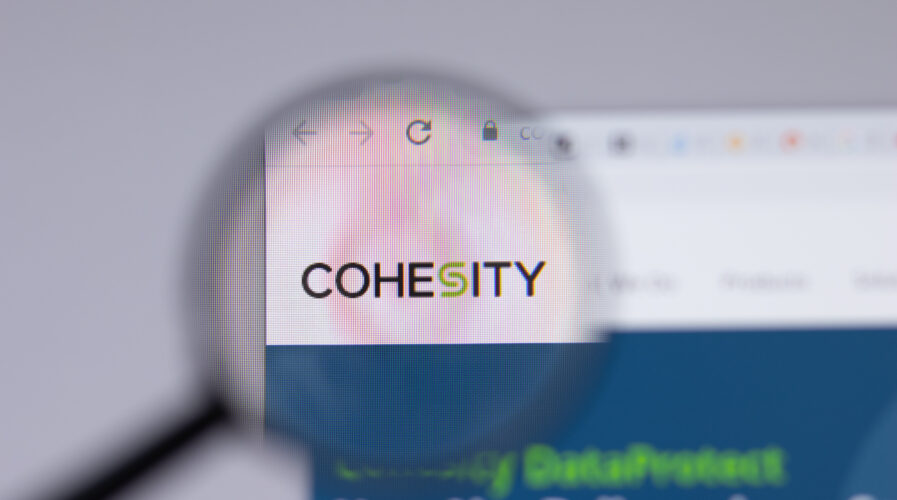
Cohesity: “In security, it’s always team sport,” CEO Sanjay Poonen shares as he peaks into 2023(Source – Shutterstock)
Cohesity: “In security, it’s always team sport,” CEO Sanjay Poonen shares as he peaks into 2023
In late 2020, Cohesity, a data protection and data management technology developer, got into a strategic collaboration with Amazon Web Services (AWS), to bring Data-Management-as-a-service (DMaaS) to joint customers. That same year, Amazon invested in Cohesity’s US$250 million E-round in April. By the end of July 2021, Cohesity had gained 60 DMaaS customers and the number had accelerated to more than 500 by the end of October this year.
The DMaaS today is known as Cohesity Cloud Services, a portfolio of data management and security software as a service (SaaS) products that are managed by Cohesity and run on AWS.
During AWS reInvent 2022, Cohesity shared that it has seen a significant increase in the number of customers that have deployed Cohesity SaaS offerings. “From under 60 customers at the end of Q4 FY21 (July 2021) to over 500 customers at the end of Q1 FY23 (October 2022),” the company shared in a statement.
To top it off, nearly 60% of Cohesity’s Cloud Services revenue comes from enterprises with US$1 billion or more in revenue, indicating that large enterprises are embracing the company’s SaaS solutions. As an indication of the momentum and key advancements Cohesity had been making following the strategic collaboration with AWS, Cohesity also announced support for new business-critical workloads.
The workloads include Amazon Simple Storage Service (Amazon S3) which can be protected and secured via Cohesity SaaS offerings. “We’re seeing rapid adoption of Cohesity’s SaaS offerings running on AWS as customers want to win the war against ransomware, accelerate hybrid cloud adoption, and enable over-stretched IT staff to focus on other business-critical tasks,” CEO and President at Cohesity said Sanjay Poonen.
During this year’s AWS reInvent, Tech Wire Asia had the opportunity to discuss with Poonen on the security landscape today and what he foresees taking shape in 2023. The interview transcript has been edited for clarity.
With tech layoffs happening rampantly, how important is it for businesses to secure data and have backup for recovery purposes. What are the challenges of data recovery with minimal tech skills available?
I think the consumer parts of the business, the business-to-consumer part, had a surge during the pandemic because there was a lot of consumer buying. At the same time, there were a surge in hiring. Now, most of them are pulling back from that because essentially no one knew how the year would play out but we have to prepare for such times. That means that you have to build a strong proposition for your products to stand out.
Cohesity stands at the junction of infrastructure and security — we protect customers’ data from things like ransomware. Considering there are like 20 ransomware attempts every second, people are pretty freaked out about the possibility that their data could get hacked. So as a result, security companies have continued to see their projects getting funded.
Our advice to our employees is that we have to work hard so that we can differentiate ourselves from everybody else. Overall, when it comes to Cohesity, we are cautiously hiring not rapidly like a few tears go. Essentially, for the coming year, we’ll watch quarter by quarter.
What role will Cohesity play in advocating better backup and recovery plans for organizations in 2023?
First off all, in a very crowded market, we stand out because customers tell us that we have the best technology platform. So because we saw the need for our innovation to stand out over everybody else, we have the customer base among the largest Fortune 100 brands — simply because our tech is way better than everyone else.
So our platform has to continue to be 10x better than all the others, to reflect strong engineering and innovation. Then we have got to really build on partnerships like the one we have with Amazon — which is only possible if we have a proposition that’s very compelling. Being in the cybersecurity segment, and as a data security and data management company, it has helped us to stand above a lot other companies when it comes to getting funded.
Do you find it a challenge, keep up with this sort of evolving landscape, considering how bad actors these days are evolving really fast?
I have been in the industry for 15 years and I still do have to assume that the bad guys are going to be continuously evolving just as fast as my old innovation. They only have to be right once, we have to be right all the time. So we, Cohesity or any other security companies especially, have to innovate much faster than them. Yet, every time an attack happens, we learn from that. Even among competitors, there’s a desire to keep the bad guys out.
Today, most of the bad guys are nation state actors from a few countries. We know which countries though, we’ve also created a security advisory council with some of the best security minds that have now joined an advisory council we have. As a result, in security, it’s always a team sport, you have to have the best advisors, giving you advice on what you need to keep doing. And if you keep doing that, you end up being ahead of the bad actors.
That is also what I have been trying to do with this company, to advise people that they need to constantly innovate in ways that are a lot like disease prevention, right. Even during the time of Covid, we had the best doctors researching the vaccine and the fact that there were many companies like Moderna and Pfizer, and everybody collaborating together, we eventually got a vaccine in record time. So to me, security is a lot like fighting a disease.
You’re constantly looking for ways by which threat research can find the bad guys. Another thing we did was we formed a data security alliance with some of the best companies in the security space — it’s never been done in our space before. So that’s how we keep doing it — by staying humble and hungry.
Would you reckon if the cost of backup and recovery is becoming a burden for businesses?
So every customer I talk to we see a dramatic, lower cost of ownership and a dramatic improvement in ROI.
How do you foresee Cohesity growing in Southeast Asia in 2023?
We have a good team in Southeast Asia and we have a very good set of customers there ranging from banks, government customers and a variety of other customers. Now, we’ve been cautious about going to every small country in Southeast Asia. What we see happening is us growing through partners in countries like Vietnam, Thailand, Philippines but for the major countries, we’ll do more than what we’d do with partners.
In terms of data backup and recovery, are there any sort of trends you foresee taking place next year?
Firstly, data volumes are exploding significantly and I don’t think that stops even if the economy starts to shrink. Secondly, the cyber threat landscape is only getting worse. When I saw the stats at the end of 2021, 20 ransomware attempts every second, it shows how those bad actors are trying to compete to see who can have the biggest name for themselves or the biggest place to monetize.
Most of them are targeting very vulnerable targets like schools and hospitals and I think that will continue.
Data localization requirements are picking up with more countries actually coming up with laws with data localization. Is there any impacting Cohesity in any way?
I think there will always be sovereign data requirements and I think that there’s a tremendous opportunity for us to partner with companies to help them keep up with all the local rules.
READ MORE
- 3 Steps to Successfully Automate Copilot for Microsoft 365 Implementation
- Trustworthy AI – the Promise of Enterprise-Friendly Generative Machine Learning with Dell and NVIDIA
- Strategies for Democratizing GenAI
- The criticality of endpoint management in cybersecurity and operations
- Ethical AI: The renewed importance of safeguarding data and customer privacy in Generative AI applications


